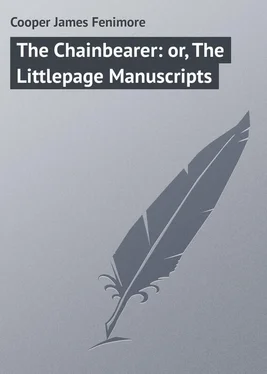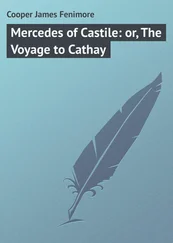James Cooper - The Chainbearer - or, The Littlepage Manuscripts
Здесь есть возможность читать онлайн «James Cooper - The Chainbearer - or, The Littlepage Manuscripts» — ознакомительный отрывок электронной книги совершенно бесплатно, а после прочтения отрывка купить полную версию. В некоторых случаях можно слушать аудио, скачать через торрент в формате fb2 и присутствует краткое содержание. Жанр: foreign_prose, на английском языке. Описание произведения, (предисловие) а так же отзывы посетителей доступны на портале библиотеки ЛибКат.
- Название:The Chainbearer: or, The Littlepage Manuscripts
- Автор:
- Жанр:
- Год:неизвестен
- ISBN:нет данных
- Рейтинг книги:5 / 5. Голосов: 1
-
Избранное:Добавить в избранное
- Отзывы:
-
Ваша оценка:
- 100
- 1
- 2
- 3
- 4
- 5
The Chainbearer: or, The Littlepage Manuscripts: краткое содержание, описание и аннотация
Предлагаем к чтению аннотацию, описание, краткое содержание или предисловие (зависит от того, что написал сам автор книги «The Chainbearer: or, The Littlepage Manuscripts»). Если вы не нашли необходимую информацию о книге — напишите в комментариях, мы постараемся отыскать её.
The Chainbearer: or, The Littlepage Manuscripts — читать онлайн ознакомительный отрывок
Ниже представлен текст книги, разбитый по страницам. Система сохранения места последней прочитанной страницы, позволяет с удобством читать онлайн бесплатно книгу «The Chainbearer: or, The Littlepage Manuscripts», без необходимости каждый раз заново искать на чём Вы остановились. Поставьте закладку, и сможете в любой момент перейти на страницу, на которой закончили чтение.
Интервал:
Закладка:
Although I got the hand of Ursula Malbone, I could not catch her eye. She did not avert her face, neither did she affect coldness; but she was not at her ease. I could readily perceive that she would have been better pleased had her uncle permitted the salutations to be limited to the bows and courtesies. As I had never seen this girl before, and could not have done anything to offend her, I ascribed the whole to mauvaise honte , and the embarrassment that was natural enough to one who found herself placed in a situation so different from that in which she had so lately been. I bowed on the hand, possibly gave it a gentle pressure in order to reassure its owner, and we separated.
"Well, now, Dus, haf you a cup of tea for the lantlort – to welcome him to his own house wit'?" demanded Andries, perfectly satisfied with the seemingly amicable relations he had established between us. "T'e major hast hat a long march, for peaceable times, and woult be glat to git a little refreshment."
"You call me major, Chainbearer, while you refuse to accept the same title for yourself."
"Ay, t'ere ist reason enough for t'at. You may lif to be a general; wilt probably be one before you're t'irty; but I am an olt man, now, and shall never wear any ot'er uniform than this I have on again. I pegan t'e worlt in this corps, Morty, and shall end it in the rank in which I began."
"I thought you had been a surveyor originally, and that you fell back on the chain because you had no taste for figures. I think I have heard as much from yourself."
"Yes, t'at is t'e fact. Figures and I didn't agree; nor do I like 'em any petter at seventy t'an I liket 'em at seventeen. Frank Malbone, now, Dus's brother, t'ere, ist a lat that takes to 'em nat'rally, and he works t'rough a sum ast your fat'er would carry a battalion t'rough a ravine. Carrying chain I like; it gives sufficient occupation to t'e mind; put honesty is the great quality for the chainbearer. They say figures can't lie, Mortaunt; but 'tis not true wit' chains; sometimes they do lie, desperately."
"Where is Mr. Francis Malbone? I should be pleased to make his acquaintance."
"Frank remainet pehint to help 'em up with their timber. He is a stout chap, like yourself, and can lent a hant; while, poor fellow! he has no lantlort tignity to maintain."
I heard a gentle sigh from Dus, and involuntarily turned my head; for she was occupied directly behind my chair. As if ashamed of the weakness, the spirited girl colored, and for the first time in my life I heard her voice, the two instances of the Indian songs excepted. I say heard her voice; for it was an event to record. A pleasant voice, in either sex, is a most pleasant gift from nature. But the sweet tones of Ursula Malbone were all that the most fastidious ear could have desired; being full, rich, melodious, yet on the precise key that best satisfies the taste, bringing with it assurances of a feminine disposition and regulated habits. I detest a shrill, high-keyed female voice, more than that of a bawling man, while one feels a contempt for those who mumble their words in order to appear to possess a refinement that the very act itself contradicts. Plain, direct, but regulated utterance, is indispensable to a man or woman of the world; anything else rendering him or her mean or affected.
"I was in hopes," said Dus, "that evil-disposed frame was up and secured, and that I should see Frank in a minute or two. I was surprised to see you working so stoutly for the Presbyterians, uncle Chainbearer!"
"I might return t'e compliment, and say I wast surpriset to see you doing the same t'ing, Miss Dus! Pesides, the tenomination is Congregational and not Prespyterian; and one is apout as much to your taste as t'e ot'er."
"The little I did was for you, and Frank, and – Mr. Littlepage, with all the rest who stood under the frame."
"I am sure, Miss Ursula," I now put in, "we all ought, and I trust we all do feel truly grateful for your timely aid. Had that timber come down, many of us must have been killed, and more maimed."
"It was not a very feminine exploit," answered the girl, smiling, as I thought, a little bitterly. "But one gets accustomed to being useful in the woods."
"Do you dislike living in the forest, then?" I ventured to ask.
"Certainly not. I like living anywhere that keeps me near uncle Chainbearer, and Frank. They are all to me, now my excellent protectress and adviser is no more; and their home is my home, their pleasure my pleasure, their happiness mine."
This might have been said in a way to render it suspicious and sentimental; but it was not. On the contrary, it was impulsive, and came from the heart. I saw by the gratified look of Andries that he understood his niece, and was fully aware how much he might rely on the truthful character of the speaker. As for the girl herself, the moment she had given utterance to what she felt, she shrunk back, like one abashed at having laid bare feelings that ought to have been kept in the privacy of her own bosom. Unwilling to distress her, I turned the conversation in a way to leave her to herself.
"Mr. Newcome seems a skilful manager of the multitude," I remarked. "He contrived very dexterously to give to the twenty-six Congregationalists he had with him, the air of being a majority of the whole assembly; while in truth, they were barely a third of those present."
"Let Jason Newcome alone for t'at?" exclaimed Andries. "He understants mankint, he says, and sartainly he hast a way of marching and countermarching just where he pleases wit' t'ese people, makin' 'em t'ink t'e whole time t'ey are doing just what t'ey want to do. It ist an art, major – it ist an art!"
"I should think it must be, and one worth possessing, if, indeed, it can be exercised with credit."
"Ay, t'ere's the rub! Exerciset it is; but as for t'e credit, t'at I will not answer for. It sometimes makes me angry, and sometimes it makes me laugh, when I look on, and see t'e manner in which Jason makes t'e people rule t'emselves, and how he wheels 'em apout, and faces 'em, and t'rows them into line, and out of line, at t'eir own wort of commant! His Excellency coult hartly do more wit' us, a'fer t'e Baron 8 8 This allusion is evidently to a German officer, who introduced the Prussian drill into the American army, Baron Steuben – or Stuy ben, as I think he must have been called in Germany – Steu ben , as he is universally termed in this country. – Editor.
had given us his drill."
"There must be some talent necessary, in order to possess so much influence over one's fellow-creatures."
"It is a talent you woult be ashamed to exercise, Mortaunt Littlepage, t'ough you hat it in cart loats. No man can use such talent wit'out peginning wit' lying and deceifing; and you must be greatly changet, major, if you are the he't of your class, in such a school."
"I am sorry to see, Chainbearer, that you have no better opinion of my agent; I must look into the matter a little, when this is the case."
"You wilt fint him law-honest enough; for he swears py t'e law, and lifs py t'e law. No fear for your tollars, poy; t'ey pe all safe, unless, inteet, t'ey haf all vanishet in t'e law."
As Andries was getting more and more Dutch, I knew he was growing more and more warm, and I thought it might be well to defer the necessary inquiries to a cooler moment. This peculiarity I have often observed in most of those who speak English imperfectly, or with the accent of some other tongue. They fall back, as respects language, to that nearest to nature, at those moments when natural feeling is asserting its power over them the least equivocally.
I now began to question the Chainbearer concerning the condition in which he found the 'Nest-house and farm, over which I had given him full authority, when he came to the place, by a special letter to the agent. The people in possession were of very humble pretensions, and had been content to occupy the kitchen and servants' rooms ever since my grandfather's death, as indeed, they had done long before that event. It was owing to this moderation, as well as to their perfect honesty, that I found nothing embezzled, and most of the articles in good condition. As for the farm, it had flourished, on the "let alone" principle. The orchards had grown, as a matter of course; and if the fields had not been improved by judicious culture, neither had they been exhausted by covetous croppings. In these particulars, there was nothing of which to complain. Things might have been better, Andries thought; but he also thought it was exceedingly fortunate they were no worse. While we were conversing on this theme, Dus moved about the room silently, but with collected activity, having arranged the tea-table with her own hands. When invited to take our seats at it – everybody drew near to a tea-table in that day, unless when there was too large a party to be accommodated – I was surprised to find everything so perfectly neat, and some things rich. The plates, knives, etc., were of good quality, but the tray was actually garnished with a set of old-fashioned silver, such as was made when tea was first used, of small size, but very highly chased. The handle of the spoons represented the stem of the tea-plant, and there was a crest on each of them; while a full coat of arms was engraved on the different vessels of the service, which were four in all. I looked at the crest, in a vague, but surprised expectation of finding my own. It was entirely new to me. Taking the cream-jug in my hand, I could recall no arms resembling those that were engraved on it.
Читать дальшеИнтервал:
Закладка:
Похожие книги на «The Chainbearer: or, The Littlepage Manuscripts»
Представляем Вашему вниманию похожие книги на «The Chainbearer: or, The Littlepage Manuscripts» списком для выбора. Мы отобрали схожую по названию и смыслу литературу в надежде предоставить читателям больше вариантов отыскать новые, интересные, ещё непрочитанные произведения.
Обсуждение, отзывы о книге «The Chainbearer: or, The Littlepage Manuscripts» и просто собственные мнения читателей. Оставьте ваши комментарии, напишите, что Вы думаете о произведении, его смысле или главных героях. Укажите что конкретно понравилось, а что нет, и почему Вы так считаете.












